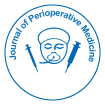
Journal of Perioperative Medicine
Open Access
ISSN: 2684-1290

ISSN: 2684-1290
Perspective - (2024)Volume 7, Issue 6
Postoperative care is an essential phase of the perioperative process, focusing on a patient’s recovery after surgery. This stage involves monitoring, managing pain, preventing complications and ensuring the patient’s comfort and safety as they transition from surgery to full recovery. Proper postoperative management can significantly influence overall surgical outcomes and patient satisfaction.
Key components of postoperative care
Monitoring and observation: One of the primary steps in postoperative care is consistent monitoring of the patient’s vital signs, including heart rate, blood pressure, respiratory rate and oxygen saturation. This helps detect any early signs of complications, such as infection, bleeding or respiratory distress. Immediate intervention can be initiated if abnormalities are identified, which reduces potential risks.
Pain management: Pain control is a key aspect of postoperative care. Effective pain management not only improves patient comfort but also supports in faster recovery by allowing patients to participate in necessary physical activities. Pain relief can be achieved through various methods, including oral and intravenous medications, epidural analgesia and regional anesthesia techniques. The choice of method depends on the type of surgery, patient needs and any pre-existing medical conditions.
Fluid and nutritional support: Rehydration and proper nutrition are important to support the body’s natural healing processes. Fluid balance must be carefully maintained, as both dehydration and fluid overload can lead to complications. In cases where a patient cannot consume food orally, alternative methods such as intravenous fluids or nasogastric feeding may be necessary until regular intake can be resumed.
Strategies to support recovery
Early mobilization: Encouraging patients to get out of bed and move as soon as it is safely possible is essential for preventing complications like Deep Vein Thrombosis (DVT) and pneumonia. Even light activities such as sitting up in a chair or taking short walks can promote circulation and improve lung function. This practice is often referred to as "enhanced recovery" and is now a standard part of many postoperative protocols.
Patient education: Educating patients about what to expect during recovery can lead to better outcomes. Instructions on wound care, medication schedules, signs of potential complications and activity limitations help patients feel more in control of their recovery. Clear communication about follow-up appointments and when to seek medical advice for issues like persistent pain or unexpected symptoms is also vital.
Infection control: Surgical Site Infections (SSI’s) are a common concern in postoperative care. Proper hand hygiene, sterile dressing changes and the use of antibiotics as indicated can help reduce the risk. Monitoring the wound for signs of infection, such as increased redness, swelling or discharge, is an ongoing part of postoperative assessments.
Addressing psychological well-being
Surgery can be a stressful experience and postoperative care should also address the mental and emotional health of the patient. Ensuring a supportive environment, providing reassurance and offering resources for mental health support can enhance the patient’s overall recovery experience. Some patients may experience anxiety or depression after surgery, particularly if their recovery is prolonged or complications arise. Health professionals should be attentive to these needs and refer patients to counseling or support groups if necessary.
Role of the multidisciplinary team
Effective postoperative care requires a coordinated approach involving multiple healthcare professionals. Surgeons, anesthesiologists, nurses, physical therapists and dietitians all play specific roles in monitoring and supporting patients through recovery. Each professional contributes expertise that collectively ensures the patient’s safety and facilitates a smoother return to normal activities.
Postoperative care is an integral part of the surgical process that extends beyond the operating room. It encompasses comprehensive monitoring, pain management, infection prevention and patient education. Ensuring high-quality postoperative care promotes better patient outcomes, reduces complications and enhances the overall recovery experience. By focusing on patient-centered strategies and involving a multidisciplinary team, healthcare providers can help patients recover effectively and regain their health after surgery.
Citation: Pascal A (2024). Postoperative Care: A Vital Aspect of Perioperative Medicine. J Perioper Med. 07:256.
Received: 23-Oct-2024, Manuscript No. JPME-24-35275; Editor assigned: 25-Oct-2024, Pre QC No. JPME-24-35275 (PQ); Reviewed: 08-Nov-2024, QC No. JPME-24-35275; Revised: 15-Nov-2024, Manuscript No. JPME-24-35275 (R); Published: 22-Nov-2024 , DOI: 10.35841/2684-1290.24.07.256
Copyright: © 2024 Pascal A. This is an open-access article distributed under the terms of the Creative Commons Attribution License, which permits unrestricted use, distribution, and reproduction in any medium, provided the original author and source are credited.